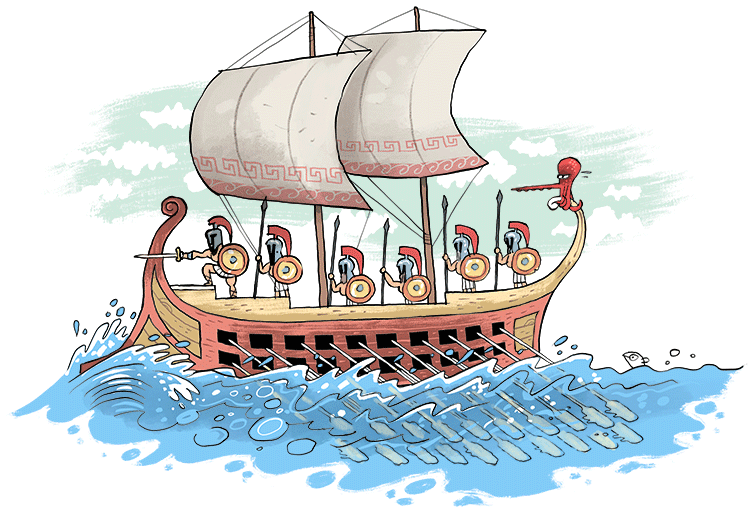Sometimes, you just find yourself in the middle of a conflict. It doesn’t matter if you want to fight or not, it just happens.
This is pretty much the story of the ancient Greek city of Corinth. Stuck smack dab in the middle of Athens and Sparta, Corinth rarely had a choice if it wanted to “get involved.”
It would have been easy for the Corinthians to just pick one side and fall into the background of history. But its unique geographic location allowed it to form an identity of its own, and add its own twist to Greek history along the way.
A Land of Rich Traders and Tyrants
If you want to get an idea as to why Corinth was able to make a name for itself, just take a look at a map. The city is located on the Isthmus of Corinth, a stretch of land connecting the Peloponnese to the rest of mainland Greece.
In addition, being right on the water allowed the Corinthians to also have control over much of the sea trade in the region.
All of this adds up to…money. Lots and lots of money.
Trade was a huge source of wealth for the ancient Greeks, and many cities depended on it for even just basic resources (mainly grain). Their strategic location allowed the Corinthians to impose taxes and tariffs on goods traveling between the two largest and most politically important cities of ancient Greece.
Yes, Athens and Sparta hated one another. But when they weren’t at war, they would trade, and Corinth always got a piece.
Because of its role in commerce, the Corinthians played a big role in bringing currency to the ancient Greeks. They began minting coins early on, and the Corinthian standard was one of the more recognized measures of coin worth in Greece.
All of this simply because it’s located on a thin strip of land between Athens and Sparta. Not too shabby, Corinth. Not too shabby.

The Founders of the Greek Navy?
Being situated right along the water on a tiny isthmus meant that the Corinthians had to learn from an early age how to sail. And because so many Corinthians also made their living trading goods, there was a lot of incentive to develop a strong maritime tradition in Corinth.
So much emphasis on the sea led to the invention of the trireme.
These large war galleys were bigger than any other ship at the time, and they had three banks of oars, which made them much easier to maneuver in tight spaces.
Over time, the rest of the Greek world began building triremes, recognizing them as the most superior warship of the era. In this sense, the Corinthians birthed the concept of a navy in ancient Greece.
The Corinthians would get lots of chances throughout history to prove their worth as sailors. Perhaps the most significant opportunity came during the Peloponnesian War, when the Corinthians teamed up with Sparta to deliver a crushing blow to the Athenians at Sicily.
Athens would never recover from this loss, and it marked the beginning of a seismic shift in Greek history. Soon, Athens would no longer sit at the top, and Sparta and Thebes would get their chance. But only briefly, for soon all of Greece would fall to Philipp and Alexander of Macedon.
The Corinthian Order
The ancient Greeks were fairly advanced architects. Their temples and other important buildings served as models for cities both near and far.
Different schools of architecture emerged, with one of them being the Corinthian Order. The others, the Ionic and Doric, come from Athens and Sparta, respectively.
These names were meant to reflect the styles of these cities. Doric designs were simple and basic, whereas Corinthian architecture is elaborate and intentionally ornate.
This comes from the Spartan’s reputation as being disciplined and austere, as well as Corinth’s for being wealthy and luxurious. Ionic styles were meant to balance the other two, offering designs somewhere in between ornate and basic.
All of these names are Greek, and the styles reflect what was being done in Greece at the time. But people didn’t start naming these designs after Greek cities until Roman times. Still, this speaks to the influence these cities had on Rome, which we all know went on to completely reshape ancient Europe, Asia, and North Africa.
The Delicate Balance of Power in Ancient Greece
Throughout its history, Corinth, not unlike other city-states not named Athens and Sparta, was caught in between these two bigshots of ancient Greece. But when Sparta beat Athens, with the aid of Corinth, it wasn’t long before Corinth was teaming up with Thebes and Athens to stop the Spartans from getting too powerful.
Part of the reason ancient Greece never unified was because the city-states were too independent and too powerful on their own.
All it took was for one alliance to change and the people in power were all of a sudden on the bottom.
The Fall of Corinth
Like the rest of the Classical Greek cities, Corinth eventually fell to the Macedonian armies of Philipp the II and later Alexander the Great, ushering in the Hellenistic Era of ancient Greece.
Later, it was conquered by the Romans and destroyed.
When Julius Caesar became Emperor of Rome, he ordered Corinth rebuilt, and it became the capital of Roman Greece. It then became a rather significant city in the Roman empire, and has made its way into modern times thanks to its many mentions in the Bible. Talk about a comeback!?
Though it was never the same, Corinth’s survival speaks to its influence on ancient history.
Sure, it doesn’t get the glory heaped on Athens and Sparta. But their support and resistance to these two powers shaped their conflicts, and along the way, helped write the story of ancient Greece.
Written by Matthew Jones
Illustrated by Pablo Velarde Diaz-Pache
Illustrated by Jean Galvao
